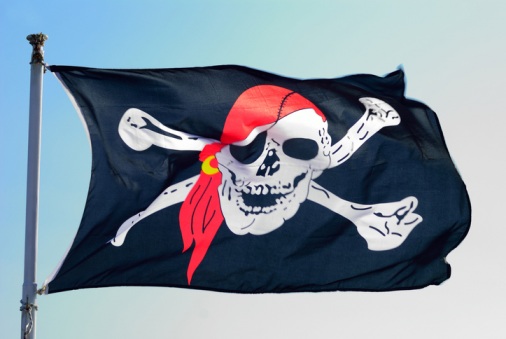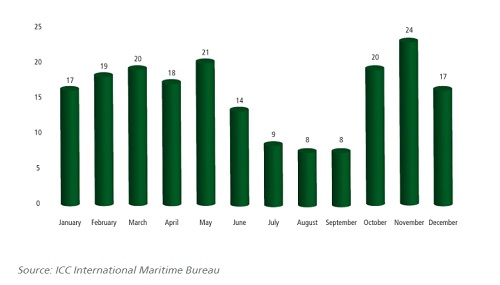Maritime piracy rises again in 2020

After steadily decreasing over the last decade, maritime piracy incidents rose again in 2020. Despite the understandable focus on Coronavirus, it serves as a valuable reminder for businesses not to neglect shipping security.
Seventeenth of July 2020. Nearly 200 nautical miles (370 km) off the coast of Nigeria, a small boat approaches a tanker ship. After pulling up alongside, eight men armed with machine guns board the tanker. They round up the 19 crewmembers and fill their own bags with the ship’s documents and valuables. What they really want, though, are hostages. At gunpoint, the pirates force 13 crew onto the waiting boat and escape. The tanker is left adrift without enough qualified sailors on board, before a nearby merchant vessel escorts it back to port. Then the nerve-wracking hostage negotiations begin.
It takes a month, but eventually all 13 kidnapped crewmembers are safely released. They almost always are. But the location and nature of the attack signify a “developing and worrying trend”, according to the ICC International Maritime Bureau’s annual report for piracy and armed robbery against ships. After years of focus on the Gulf of Aden near Somalia, piracy’s new hotspot has switched to the Gulf of Guinea on Africa’s west coast. In 2020, the area saw the highest-ever number of kidnapped crew, with 130 taken in 22 separate incidents. Overall, 2020 saw 195 recorded piracy attacks, up from 162 the previous year.
The role of economic and political conditions
In 2019, piracy attacks had reached their lowest number for 25 years. The combination of improved surveillance, international naval patrols, better on-board defences and changes to local government policies meant there wasn’t a single successful hijacking in the Gulf of Aden in 2019. For comparison: in 2010, Somali pirates, like those in the 2013 Tom Hanks film Captain Phillips, accounted for 49 hijackings and took more than 1,000 hostages.
Instead, attention has turned to West Africa and South America, where maritime piracy expert Dr Brandon Prins believes conditions now share certain similarities to those in Somalia a decade ago. Most piracy ultimately affects poor countries with weak governments, he wrote in a piece published by the World Economic Forum in May 2020. Criminals, insurgents and other groups see opportunities to raise money by stealing from passing ships. “For instance, militant groups in Nigeria … siphon oil off tanker ships and resell it on the black market”, writes Prins. “With economic hardship striking Venezuela and Brazil, poor and jobless citizens may see opportunities offshore. Weak police and corrupt officials only exacerbate the economic problems.”
Prins believes Covid-19 could also be behind the recent rise in piracy. Economic struggles may make people more desperate, while governments have more pressing concerns than what’s happening out at sea.
Precautions against piracy
Despite the understandable focus on Covid-19, Peggy Köhler-Hollenders, from HDI Global SE Marine Underwriting, says the recent increase in piracy incidents is a valuable reminder for businesses not to neglect shipping security.
She and her team provide extensive support for companies to ensure the best possible protection for both crew and cargo. This starts at the organisational stage, explains Köhler-Hollenders. “It’s crucial to consider the type of ship, the route and cruising speed. Having the right technology on board is key, from alarms and radar systems to anti-boarding measures and cybersecurity to prevent pirates from gaining access to ship systems”, she says. Personnel is also important, adds Köhler-Hollenders. All crew members need to be fully trained on how to prevent and respond to pirate attacks, while private security can provide a further level of protection should an attack occur.
Monthly comparison of incidents during January - December 2020

Authored by HDI Global
About HDI Global SE
Companies from the trading, production and service industries need an insurance partner they can rely on.
As part of the Talanx Group, HDI Global SE has been one of the leading insurers offering a broad and needs-based range of insurance solutions and accompanying services for decades.
HDI operates through foreign branches, subsidiaries and affiliates as well as network partners in more than 150 countries, offering international industrial insurance programmes.

